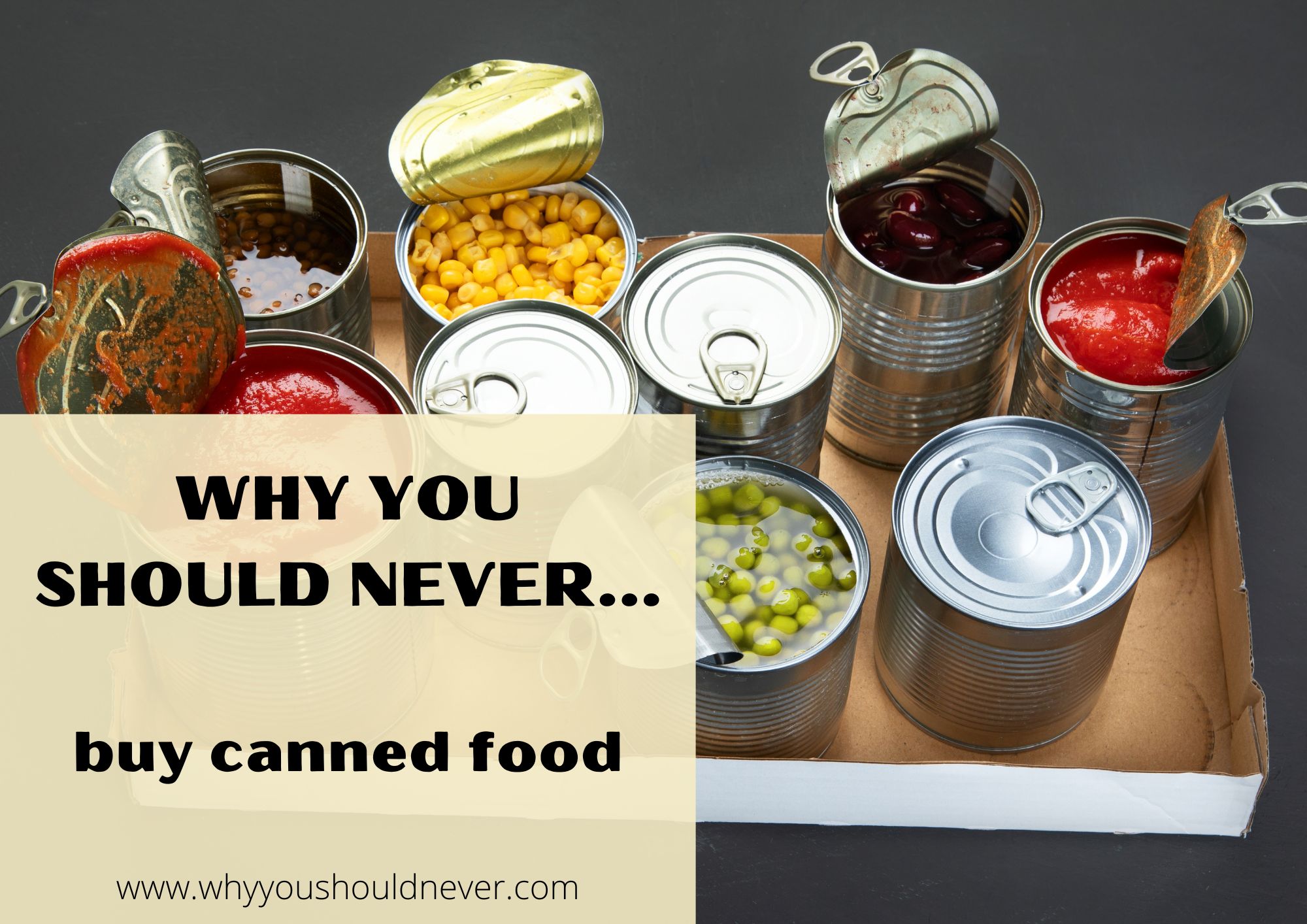![]()
Why You Should Never Buy Canned Food
Opening up the pantry and grabbing a can of soup, beans, or fruit is the ultimate easy dinner solution. Canned foods promise quick, affordable access to vegetables, proteins and fruits.
The canning process also makes these foods shelf-stable and safe to eat for years. For people with busy lifestyles, limited budgets, and not much cooking experience, these bad boys are a lifesaver!
Or are they?
Although it sounds like canned foods offer some real benefits in terms of convenience, affordability, and longevity, it’s worth looking at the potential downsides before relying on them too heavily.
10 disadvantages of canned food
1. Nutrient loss
Canned foods go through a high heat process that unfortunately depletes nutrients like vitamins C and B. One study found that canned fruits and vegetables have lower amounts of vitamin C, phytonutrients, and antioxidants compared to their fresh or frozen counterparts.
Another downside is that canned produce tends to be picked before peak ripeness, when nutrient levels are highest.
2. Higher sodium and sugar content
Sodium is added to most canned goods as a preservative and flavor enhancer. One cup of canned soup can contain over 1000 mg of sodium, which is nearly half of the daily recommended limit. Overdoing it on sodium has been linked to high blood pressure, heart disease, and stroke.
In addition, canned fruits are often packed in sugary syrups, boosting the calorie and sugar content. A 1/2 cup serving of canned peaches can have over 15 grams of added sugar. Consuming excess added sugars is associated with obesity, diabetes, liver disease, and more.
3. BPA exposure risk
Many canned goods are lined with BPA (Bisphenol A), a chemical that can seep into the food over time. Studies show that BPA exposure is linked to hormone issues, brain development problems, cancer, and obesity.
While some companies now use BPA-free cans, it’s impossible to know for sure unless the label states it clearly.
4. Higher cost over time
Although canned goods seem cheap at face value, buying fresh produce often works out to be less expensive in the long run. Canned items are heavy, meaning you get less actual food for the weight. And nutrient loss means you aren’t getting as much value per dollar spent.
5. Negative environmental impact
Cans require more energy, materials, and resources to produce than other methods, making their life cycle less eco-friendly. BPA liner waste and non-biodegradable metal contribute to landfill buildup.
The canning process also emits more greenhouse gases. Large scale agriculture needed for canned food leads to pesticide usage, water waste, and soil depletion as well.
6. Texture and taste issues
The canning process can alter the texture of foods, making them mushier or soggy compared to fresh or frozen alternatives. Canned fruits and veggies can lose their crispness and end up overcooked and less appealing in terms of mouthfeel.
The high heat processing also dulls natural flavors, resulting in canned foods tasting more metallic and less vibrant.
7. Highly processed
Canned items are considered ultra-processed foods, meaning they undergo heavy industrial processing. This gives them a long shelf life but strips away natural fiber.
Studies link highly processed food consumption to higher risks of chronic diseases like cancer, heart disease, and diabetes. Minimally processed fresh or frozen foods retain more health-promoting compounds.
8. More hassle to get to the food
Canned goods require you to open the can using a manual or electric can opener before you can access the contents. This adds an extra step compared to simply rinsing off fresh produce or popping a frozen meal in the microwave.
Struggling with a tricky can lid, dealing with jagged edges, or draining the liquids within can make canned foods more inconvenient despite their reputation for being quick and easy.
9. Encourage hoarding
The long shelf life of canned goods enables people to amass large stockpiles that often go unused. This overbuying tendency can lead to wasted money, expired foods, and unnecessary strain on storage space.
10. Safety issues
Cans, by nature, aren’t the safest things on the shelf. For starters, improper canning can allow botulism spores to survive, leading to severe food poisoning.
And thanks to the long shelf-life, people are more likely to keep cans in storage for long periods, thereby increasing the likelihood of dents, bulges, or rust on the cans over time. Eating food from damaged, swelled, or leaking cans is very unsafe.
Getting into the cans themselves also poses a risk, as can openers can leave sharp edges that cut fingers.
Final thoughts
So, you thought canned foods were the superheroes of your pantry, huh? Think again! It turns out, they might just be the sidekicks, and not the superpower-wielding kind.
While they can help in a time crunch, these metal-clad munchies pack some not-so-great surprises. From hidden salts and sugars to a taste that’s more can than corn, these pantry staples might need a downgrade in your kitchen hierarchy.
Look, nobody’s saying you should kick cans to the curb entirely. But maybe they shouldn’t get the starring role in your food lineup. Fresh and frozen foods are waiting in the wings, ready to take center stage with more flavor and fewer question marks. Give ’em a shot—you might just find a new hero for your taste buds and your health.
